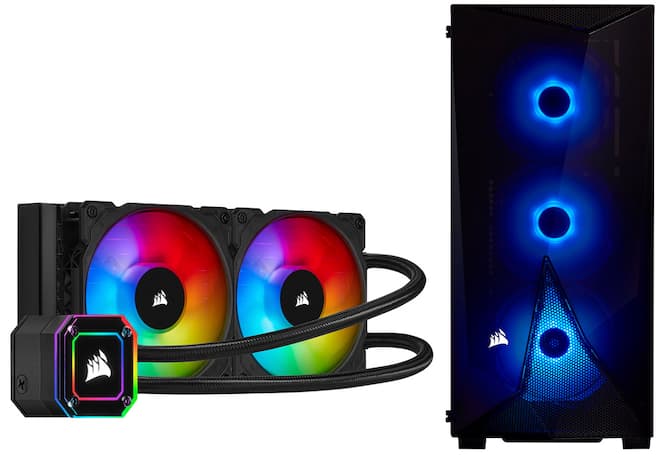Liquid Cooling vs. Air Cooling: Which Is Better for Gaming Desktops?

Finding the best PC cooling method for you
As PC gaming keeps evolving with cutting-edge graphics and faster processors, your computer needs to keep up with these advancements to deliver the best performance. This is why when it comes to building or upgrading a gaming desktop, one of the most critical decisions you’ll face is choosing the right cooling system.
Both liquid cooling and air cooling have their own advantages and drawbacks. We will delve into the intricacies of each cooling method, comparing their performance, reliability and maintenance requirements to help you determine which is best for your gaming desktop.
Understanding PC cooling systems
The main objective of both CPU water cooling and CPU air cooling is to efficiently dissipate heat generated by your PC’s processor, ensuring optimal performance and stability whenever you’re gaming. By maintaining lower temperatures, these PC cooling options help prevent thermal throttling, which is when the CPU reduces its clock speed to avoid overheating. This can lead to decreased performance and potential damage to the CPU over time.See Disclosure 1
Effective CPU cooling not only protects your CPU but also contributes to the overall health of your system by preventing heat buildup in other components, such as the GPU and motherboard. Regular maintenance, such as cleaning dust from fans and heatsinks, allows for a steady stream of airflow to help keep your system cool. The bottom line is that if you prioritize a reliable PC cooling solution, you can help extend the life of your hardware.
How does liquid cooling work?
Liquid cooling works by circulating a water-based fluid through a closed-loop system to remove heat generated by components like the CPU and GPU in your gaming desktop. A liquid-cooled PC typically features a radiator, water block and pump, which all work together to transfer heat away. Key features of a liquid cooling system include:
- Closed-loop design. This pre-built, self-containing cooling system where the liquid coolant circulates in a sealed loop helps reduce the risk of leaks.
- Efficient heat dissipation. By circulating a coolant through a water block attached to the component, liquid cooling systems absorb and transfer heat more effectively than air cooling.
- Improved aesthetics. Many liquid cooling systems offer customizable RGB lighting and sleek designs, perfect for setting the mood in any gaming setup.
- Enhanced overclocking potential. Liquid cooling systems allow components to run more effectively at lower temperatures when overclocked by dissipating extra heat.
- Lower operating noise. By using a circulating coolant and larger, slower CPU fans, liquid cooling creates a quieter environment that allows you to stay fully immersed in gameplay.
A water-cooled PC runs at lower temperatures compared to traditional air-cooled systems, providing more consistent performance during intensive gaming sessions. However, an air-cooled PC can still offer reliable cooling for most gaming needs, especially when equipped with a quality CPU cooling fan and proper airflow management.
How does air cooling work?
Air cooling works by using heatsinks and fans to dissipate heat generated by the CPU and GPU of your gaming PC.See Disclosure 2 What is a heatsink, you might ask? A heatsink, typically made of metal with a large surface area, absorbs heat from the component it’s attached to. As the heatsink heats up, fans blow air over its surface, transferring the heat away into the surrounding air. Other key features of an air cooling system include:
- Simplicity. Air cooling systems are generally easier to install while also requiring less maintenance than using a liquid cooling system.
- Reliability. With fewer moving parts and no risk of liquid coolant leaks, air cooling solutions are often seen as more dependable.
- Noise levels. While some air coolers can be noisy, the best air CPU coolers with the best CPU fans can operate quietly and provide an unobtrusive gaming experience.
- Cost-effectiveness. Air cooling tends to be more affordable than liquid cooling, making it a popular choice for PC gaming enthusiasts on a budget.
- Variety of designs. Available in various shapes and sizes, air coolers allow you to customize your gaming setup based on your PC’s design and space constraints.
Although not quite as proficient as the best liquid CPU coolers, air cooling remains a popular choice among gamers and PC builders due to its balance of efficiency, cost and ease of use. By choosing the right heatsink and fan configuration, you can create a reliable and quiet cooling solution that meets your gaming needs without breaking the bank.
Liquid vs. air cooling: what is the best CPU cooler for gaming?
While both liquid-cooled gaming PCs and air cooling systems rely on case fans to maintain airflow to efficiently remove heat from critical components of your gaming desktop, the cooling processes are fundamentally different. Liquid cooling circulates a coolant through a closed-loop system to effectively dissipate heat away from the CPU and GPU. In contrast, air cooling uses heatsinks and fans to directly transfer heat into the air, which is simpler but sometimes less effective.
So, if you’re building a gaming PC and want the most effective cooling system, you really can’t go wrong with a liquid CPU cooler. But, if you want a more straightforward setup with less maintenance and potentially lower costs, an air cooling system can still deliver reliable performance. Whichever PC cooling option you ultimately choose, proper air flow will help provide an optimal gaming experience for years to come.
References
1. Benoit-Cattin, Theo, Delia Velasco-Montero and Jorge Fernandez-Berni. “Impact of Thermal Throttling on Long-Term Visual Inference in a CPU-Based Edge Device.” Electronics, MDPI. December 10, 2020. https://doi.org/10.3390/electronics9122106.
2. Sexton, Michael Justin Allen and Soderstrom, Thomas. “PC Cooling 101: How to Buy the Right Air or Water Cooler for Your Desktop CPU.” PC Magazine, Ziff Davis, LLC. April 6, 2022. https://www.pcmag.com/how-to/pc-cooling-101-how-to-buy-the-right-air-or-water-cooler-for-your-desktop.